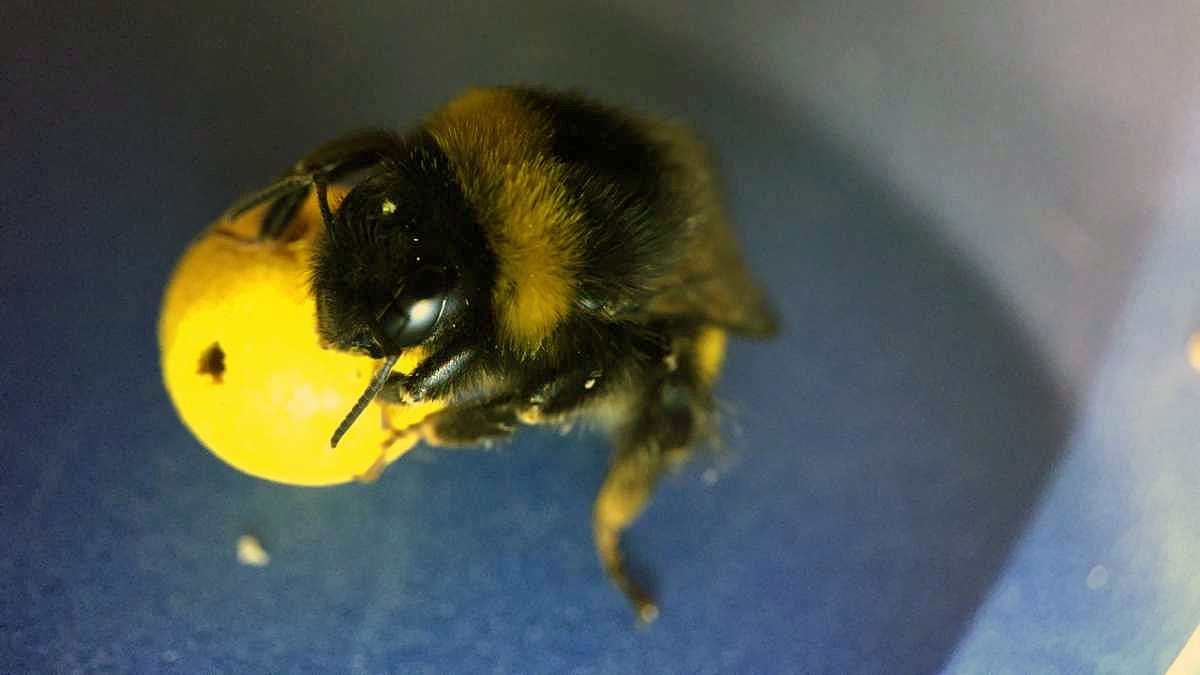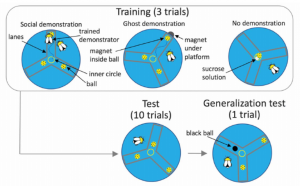The new premier league players
“The bees solved the task in a different way than what was demonstrated, suggesting that observer bees did not simply copy what they saw, but improved on it,”
Queen Mary, University of London’s School of Biological and Chemical Sciences (QMUL)
Back in February main stream media were amazed at a story that demonstrated the humble bumble bee could play football. Obviously, the bees had not acquired a new fondness of sport but what they had shown was cognitive flexibility under ecological pressure. Loukola et al.’s experiment with bumble bees shows tool use can now be extended to invertebrates, having previously only ascribed to humans, primates, marine animals and birds.
The team from Queen Mary, University of London’s School of Biological and Chemical Sciences (QMUL) published their findings in Science and are the first to show this ‘unprecedented behaviour’. The experiment did involve the bumble bees (Bombus spp.) utilising a bee sized yellow football to gain rewards, so the mainstream wasn’t wrong in suggesting the team had trained bees that could play football. The bees were trained to push a yellow ball towards a central platform to release a door that allowed access to a sucrose solution (sugar).
The Bees were trained using three methods; one group watched pretrained bees complete the task, another cohort watched a ‘ghost’ ball being moved using a magnet under the platform and a final ‘control’ group had no demonstration.
After pre-training all bees to find 30% sucrose solution in a hole under a half-ball in a square blue platform, bees were allocated to three demonstration groups for training (three trials). The social group received demonstrations by a live conspecific moving the furthest of three balls located at various distances from the center of a large blue platform, to the center to gain reward. The nonsocial group received a ghost demonstration via moving the furthest ball with a hidden magnet. The bees that did not receive demonstration (No) found one ball at the center of the platform already with reward. Research paper: Bumblebees show cognitive flexibility by improving on an observed complex behavior. Adapted from: https://www.researchgate.net/publication/313940786_Bumblebees_show_cognitive_flexibility_by_improving_on_an_observed_complex_behavior [accessed Apr 5, 2017].
“The bees solved the task in a different way than what was demonstrated, suggesting that observer bees did not simply copy what they saw, but improved on it,” says joint lead author Dr Olli J. Loukola. “This shows an impressive amount of cognitive flexibility, especially for an insect.”
The findings would suggest that human prejudices of brain size to body mass ratios mean nothing when it comes to the ability of animals and insects to cognitively adapt to ecological pressures. This may mean that wild bees may still be able to reverse the changes to their population numbers which have been declining for decades.
“Our study puts the final nail in the coffin of the idea that small brains constrain insects to limited behavioural flexibility and only simple learning abilities,” says QMUL’s Professor Lars Chittka.
Slowing the decline
Whilst the study gives promising insights into the cognitive adaptability of the bees, it’s very debatable that the current ecological pressures being imposed on bees will be overcome through this adaptability. Bumble bee numbers in the wild had already declined in the in the 70s.
Pesticides, especially insecticides, are often blamed for bee and other pollinator losses. Particular concern has been raised about some neonicotinoid insecticides (especially clothianidin, imidacloprid and thiamethoxam). These systemic insecticides were used by farmers and gardeners to control a wide range of pests.
Attention has been focused on this group of insecticides because minute quantities of these systemic chemicals get into sap, nectar and pollen of treated plants. In addition, several bee poisoning incidents with these neonicotinoids have occurred abroad as a result of incorrect application by farmers and some research has shown harmful, often sub-lethal effects on the foraging ability of honeybees and the colony size of bumblebees. However, other research showed no clear evidence of harm being caused to bees when the chemicals are applied correctly.
Beyond pesticides habitat change, disease, competition between species and climate change may all be playing a part in the decline. It is plausible to think bees could adapt to one ecological pressure but multiple threats may require Herculean like adaptation.
The Royal Horticultural Society (RHS) has a good website describing the threats faced by our bees and what individuals can do to aid them in their struggle.
This study highlights we are only beginning to understand the complexity and ability of life on earth, we may be the supreme species but being ubiquitous does not mean we have unique abilities. Preservation of Bees is not only vital for furthering our scientific knowledge it is vital for our own survival, with pollinators like bees being an integral part of our ecosystem.
The Bees demonstrate an impressive amount of cognitive flexibility. © Copyright Olli Loukola/QMUL
Reference(s)
- OLLI J. LOUKOLA, CLINT J. PERRY, LOUIE COSCOS, LARS CHITTKA Bumblebees show cognitive flexibility by improving on an observed complex behavior. Science, 24 FEB 2017 : 833-836
- Paul H Williams The Distribution and Decline of British Bumble Bees (Bombus Latr.) Journal of Apicultural Research,21(4), 236–245. http://doi.org/10.1007/s40618-015-0336-1
7 Amazing Health Benefits Of Bee Pollen
[spacerpanel id=”2″]More in Science[/spacerpanel]
- Millions of new solar system objects to be found...on June, 2025 at 1:34 am
Astronomers have revealed new research showing that millions of new solar system objects are likely to be detected by a brand-new facility, which is expected to come online later this year.
- Tea, berries, dark chocolate and apples could...on June, 2025 at 3:50 pm
New research has found that those who consume a diverse range of foods rich in flavonoids, such as tea, berries, dark chocolate, and apples, could lower their risk of developing serious health conditions and have the potential to live longer.
- Being in nature can help people with chronic back...on June, 2025 at 3:50 pm
Researchers asked patients, some of whom had experienced lower back pain for up to 40 years, if being in nature helped them coped better with their lower back pain. They found that people able to spend time in their own gardens saw some health and wellbeing benefits. However, those able to immerse […]
- Scientists say next few years vital to securing...on June, 2025 at 3:50 pm
Collapse of the West Antarctic Ice Sheet could be triggered with very little ocean warming above present-day, leading to a devastating four meters of global sea level rise to play out over hundreds of years according to a new study. However, the authors emphasize that immediate actions to reduce […]
- First direct observation of the trapped waves...on June, 2025 at 3:50 pm
A new study has finally confirmed the theory that the cause of extraordinary global tremors in September -- October 2023 was indeed two mega tsunamis in Greenland that became trapped standing waves. Using a brand-new type of satellite altimetry, the researchers provide the first observations to […]
- DNA floating in the air tracks wildlife, viruses...on June, 2025 at 3:48 pm
Environmental DNA from the air, captured with simple air filters, can track everything from illegal drugs to the wildlife it was originally designed to study.





